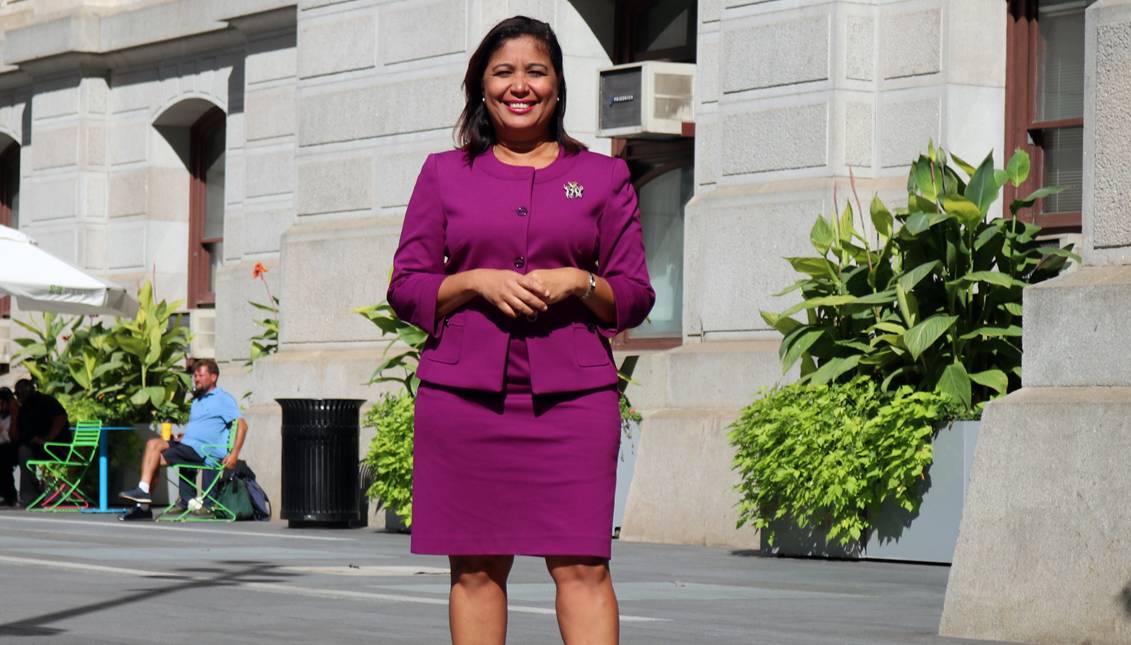
Maria Quiñones-Sánchez, PHA designate 240 affordable housing units to combat Philadelphia’s housing crisis
Rapid gentrification is transforming the landscape in Philadelphia’s Puerto Rican Communities.
Philadelphia Councilmember Maria Quiñones Sánchez (7th District) was joined by city agencies on Nov. 18, to announce the creation of 240 new affordable housing units in the South Kensington neighborhood of Norris Park in conjunction with the Philadelphia Housing Authority (PHA).
The units going in the largely Puerto-Rican neighborhood will aid a quickly gentrifying landscape, and for Quiñones Sánchez, it’s a personal achievement.
“When I came from Puerto Rico in 1969, I landed in a PHA scattered site in Spring Garden,” she said, explaining how her family later moved to an eastern North Philadelphia neighborhood with the help of Asociación of Puertorriqueños en Marcha [APM].
That early aid was vital for her family’s progress on the mainland.
“Having lived that, and having used PHA housing supports, our family was able to transition into homeownership. And we purchased our home in the early 70’s in the Hunting Park community,” said Quiñones-Sánchez
Quiñones Sánchez is making sure Philadelphians with similar backgrounds can live the dream of owning a house, even with the housing crisis the city currently faces.
She now lives in Norris Square, a neighborhood she described as feeling the pressures of what will happen to her historically Puerto Rican community as the housing crisis intensifies.
Gentrification continues to eat at similar communities from the outside in, until they reach the core and eventually transplant entire neighborhoods.
But through Quiñones Sánchez’s initiative and her support, four of Philadelphia's community development corporations now have 240 vacant properties to redevelop as affordable housing.
It will also be an example of how the government, in conjunction with community and private partnerships, can preserve historic neighborhoods like those in South Kensington.
She explained the benefits of the location, which include its proximity to several transportation stops that are pivotal to ensuring access to jobs, with easy access to Center City.
As for the organizations involved, Quiñonez-Sánchez has called for an “all hands on deck” approach to the development of these 240 affordable housing units “to ensure the development happens in a very intentional way” by aggressively fighting for inclusive housing.
These organizations include the Norris Square Civic Association, Asociación of Puertorriqueños en Marcha (APM), HACE, and Esperanza.
“These neighborhoods don’t happen by accident. Government has to be intentional, it has to be focused, it has to be committed, it has to see itself as a facilitator to do this process,” Quiñones Sánchez said.
The issue must see an intersectional approach through government funding, legislation, community efforts, and private organizations.
That’s especially during a global pandemic, where the lives of Latinx families in Philadelphia – a large portion of which are Puerto Rican — have been disproportionately affected financially, mentally, and health-wise.
“Now more than ever before, housing is health. There is a dire need for more local housing in Philadelphia and in the country as a whole,” Jeremiah continued.
RELATED CONTENT
He also said PHA will use the 240 properties to maintain affordability.
To him, it’s a domino effect that cannot be denied.
The correlation between stable housing and quality of life is a substantive component when it comes to addressing issues of health disparity amid a housing crisis. It’s an investment.
“We need to provide and produce Latinos in the City of Philadelphia and people in the 7th district, with an equitable share of housing and housing access. That conversation was produced with immediate responses from the organizations in question,” Cortés explained.
He referenced the Roberto Clemente homes in North Philadelphia, a $16 million project as an example.
“Giving a person stability in a house. Creating — in our case, what would be permanent — low income rental units in the barrio will provide our people, our neighbors with an opportunity to have the kind of stability that produces the kind of outcomes that change lives,” said Cortés.
“I suggest that all of the folks become familiar through those housing counseling agencies so that they can ensure that they are preparing their credit, all of the housing counseling supports that they need to be able to be eligible,” Quiñones-Sanchez advised.
The councilmember also stressed the need to begin the process now because oftentimes inquiries are received after a site is built or converted, and there is usually already a waiting list.
The involved parties all agree that the earliest projects are already in the works for 2021.
All 240 sites will be subject to HUD approval.











